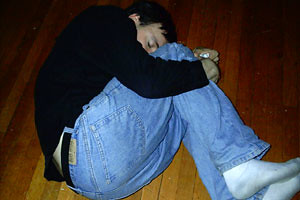Readings: Wisdom 1:13-15,2:23-24; Psalm 29(30):2,4-6,11-13; 2 Corinthians 8:7,9,13-15; Mark 5:21-43
Picture: cc dahveed76
My dear friends, are you familiar with the foetal position? It’s when the body is curled up into a ball, with the arms and legs pulled into the chest, and the head brought forward. According to Wikipedia, sometimes, when (people have) suffered extreme physical or psychological trauma… they will assume this position or a similar one. It’s an instinctive posture of withdrawal and self-preservation.
And this posture can be adopted not just physically, but also psychologically, emotionally, even spiritually. To be constantly in the mode of looking inward and fending for oneself or one’s own. Focused only on one’s security and survival. But even if it may be necessary to adopt this posture from time to time, this is surely no way to live a fully human life. So how to move out of the foetal position, when it’s time to do so? I believe this is a question that our readings help us to ponder today.
In the gospel of Mark, Jesus and his disciples cross from one bank of the Sea of Galilee to another, and back again. And wherever they go, they keep meeting people touched by trauma. People afflicted by diseases, and possessed by demons. People hungry for food, not just for their bellies, but also for their minds and hearts. People needing to be consoled and healed, guided and reconciled. People who might be forgiven for focusing only on their own wellbeing.
What do the crowds, who flock to Jesus in the gospel, need most, if not a way out of the foetal position? That anxious posture of withdrawal and self-preservation. And yet, isn’t it striking to note that, even though many are pressing all round him, these people don’t seem to find what they need. It’s only the bleeding woman’s touch that brings her healing. The touch of faith. But what is it about the woman’s touch that enables her to draw power from the Lord, when others could not? Perhaps it’s the courage to believe what is written in the first reading. That even though our world seems shrouded in suffering and death, God takes no pleasure in the extinction of the living, for God created all for life, and not destruction.
And how to find the courage to keep reaching out to the Lord in faith? Perhaps we need to allow the Lord to touch us first. In the same way that Jesus touches the dead girl in the gospel, when he takes her by the hand, and calls her to rise. The same touch that Paul describes so beautifully in the second reading, when he tells his readers to remember how generous the Lord Jesus was: he was rich, but he became poor for your sake, to make you rich out of his poverty. If we are able to reach out to the Lord in faith, it’s only because he has first reached out to us with the touch of mercy. Empowering us, in our turn, to show mercy to others as well.
Isn’t this life-giving movement from trauma to faith and mercy something that we need to experience especially now, as our world cautiously negotiates the path out of various degrees of lockdown? To learn to see beyond our own immediate needs to the sufferings of others? Sisters and brothers, what must we do to let the Lord lift us out of the foetal position today?


